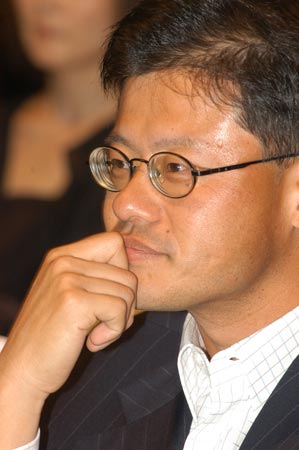LinkedIn to Chinese market, oppotunity and challenge
 My friend Jia Jiang, currently working for LinkedIn on its China marketing strategy, visited me recently. In his visit, we shared how LinkedIn might enter China---the largest growing market in the world. Linked into China, how many opportunities and challenges the company will face?
My friend Jia Jiang, currently working for LinkedIn on its China marketing strategy, visited me recently. In his visit, we shared how LinkedIn might enter China---the largest growing market in the world. Linked into China, how many opportunities and challenges the company will face?
Social Network, the difference between Chinese and western culture
In western culture, social is part of the life. In Chinese culture, however, social is the life.
I have been at United States for more than 10 years. Before it, I was in China. For years I have observed the cultural difference between the two countries. Certainly in both countries social networking is a very important part of normal person's regular life. There is, however, some subtle but critical difference. United States encourages individual heroism. Social networking is thus auxiliary to this general goal. China, on the other hand, encourages collaboration but discourages individual heroism in general. In China social networking is thus the goal. When facing a problem, a typical American thought is to solve it by oneself or otherwise engage his social network under his direction to solve it. By contrast, a typical Chinese thought is to engage one's social network to solve it and make himself be a member of the collaborative team.  Philosophically, Chinese style social networking is based on the Doctrine of the Mean (Chinese: 中庸; pinyin: Zhōngyōng). Chinese people believe in that if one tree is higher above all the others, wind will destroy it first (Chinese: 木秀于林,风必摧之; pinyin: mù xiù yú lín,fēng bì cuī zhī). Hence the principle of surviving but also living well is to follow Doctrine of the Mean---be neither too outstanding nor too insignificant. This philosophy is the basis of Chinese social networking.
Philosophically, Chinese style social networking is based on the Doctrine of the Mean (Chinese: 中庸; pinyin: Zhōngyōng). Chinese people believe in that if one tree is higher above all the others, wind will destroy it first (Chinese: 木秀于林,风必摧之; pinyin: mù xiù yú lín,fēng bì cuī zhī). Hence the principle of surviving but also living well is to follow Doctrine of the Mean---be neither too outstanding nor too insignificant. This philosophy is the basis of Chinese social networking.
Such a subtle difference actually indicates some fundamental difference between Chinese social networking and western social networking. If a western social networking company wants to enter and make itself succeed in the Chinese market, it must not only understand the difference but also know how to adjust their particular marketing strategy and even technological user interface design respectively.
LinkedIn, strengths and weaknesses with respect to Chinese market
LinkedIn, as well as all the other western social networking companies, advocates individual-centric social networks. In particular, LinkedIn makes much effort on composing individual's professional profiles in order to strengthen formal business connections among its users.
The strengths of LinkedIn with respect to Chinese market are obvious. In general, western software companies have advanced technologies better than their Chinese competitors. As one of the early adopters of Web 2.0, LinkedIn has strong technology team as well as excellent management team who really understand Web 2.0 in principles and technical details. LinkedIn has successfully branded itself to be the leader of professional social networks. In its particular domain, LinkedIn profile is more effective than either Facebook profile or MySpace profile.
Lack of the elements of Chinese culture is an immediate weaknesses for not only LinkedIn but also all the other western social networking sites which plans to enter Chinese market. No western companies can succeed in China by simply translating their sites into Chinese, especially if they are the social networking sites. (Hence I don't expect the recently reported Facebook's initial plan of entering Chinese market would be a success.) My friend Gang Lu recently wrote at Read/WriteWeb a post about the Facebook clones in China. One reason that many of these Chinese clones of Facebook are expected to grow better than Facebook China is that every one of them has customized their sites with certain unique Chinese cultural elements that the official Facebook China does not have. If LinkedIn expects to enter China, the culture customization is the first crucial barrier it has to overcome.
Another specific problem of LinkedIn entering China is its requirements of filling in detailed career information in profiles. Certainly this requirement represents the value of LinkedIn services. Such a request, however, could be seen as a serious thread by the Chinese government. Many foreign observers are surprised that there are much fewer LinkedIn copycats than the Facebook copycats in China. Indeed, it is not surprising at all from a native Chinese's eye. The Chinese government would simply not tolerate any private company to collect sensitive employment records of all Chinese people, let it alone a foreign company. In tradition, (due to the so-call "national security") only the government or certain authorized public organizations may have the privilege of owning personal profiles with detailed career information (Chinese: 个人档案). This is why even Chinese people feel difficult to copy the business model of LinkedIn in China. This issue might be a killer for the future of LinkedIn in China.
Can LinkedIn succeed in China?
Despite of all the problems, LinkedIn still has its chance to succeed in Chinese market. The key of success is, however, a point I mentioned at the beginning---Doctrine of the Mean (中庸)! The following are several particular suggestions for LinkedIn to enter China.
1) Never ever claim itself to be the leader of professional social networks in Chinese market.
2) Narrow down its domains of professional social networks to only the insensitive realms. Explicitly prohibit the adding of career information from such as army, nuclear plants, police department, and various other sensitive, national security related government departments. Narrow the use of LinkedIn China to pure business, especially on the realms such as the Sino-American exporting business.
3) Change the individual-centric LinkedIn profiles to group-centric LinkedIn profiles. Intentionally decrease the significance of individuals in the LinkedIn network of China. By contrast, significantly increase the weight of groups in the LinkedIn network of China. Such a change may require a major re-design of LinkeIn China user interface.
4) Add the unique Chinese cultural elements to the LinkedIn China site.
I must say that some of my suggestions are indeed controversial. But they are critical for western companies to succeed in China, not only just about LinkedIn.
First of all, any attempt of monopolizing Chinese market on information management may not survive long, even if it would succeed once. Chinese government had tolerated foreign companies to monopolize the TV set market in China for many years, and it is now even tolerating the foreign monopoly of gold mines in China. But it would never tolerate foreign monopoly of information access or information management in China. Neither TV set nor gold mine is directly about people. But information management is directly about people. Loss of a few money would not be pleasant but it is tolerable. Loss of the control of people, however, would be a disaster in the present China, and thus it is absolutely intolerable. LinkedIn must abandon the unrealistic dream of being the leader of professional social networks in Chinese market.
By not being the general leader does not mean it would not be profitable. Due to the large population in China, LinkedIn China in vertical could be a great success. By narrowing its realm to several most profitable realms, LinkedIn may have more focused design of its Chinese user interface with unique cultural elements and improved the quality of its services that are then more focused.
Furthermore, by emphasizing the group-centric in contrast to individual-centric LinkedIn may help its Chinese subscribers release the pressure of disclosing information for a foreign company. Actually, it has been a general law of 中庸 in China since ancient time. Let LinkedIn China be in a chinese-style infrastructure of group guiding individuals in contrast to in the western-style infrastructure of individual composing groups. I guess the same philosophy may even be helpful for re-modeling many of the current Chinese social network sites too, if they want to get a break out of the highly competitive SNS market in China.
The last question: what is group-centric with respect to individual-centric in social networking? I may write another post dedicating to this topic later.
















